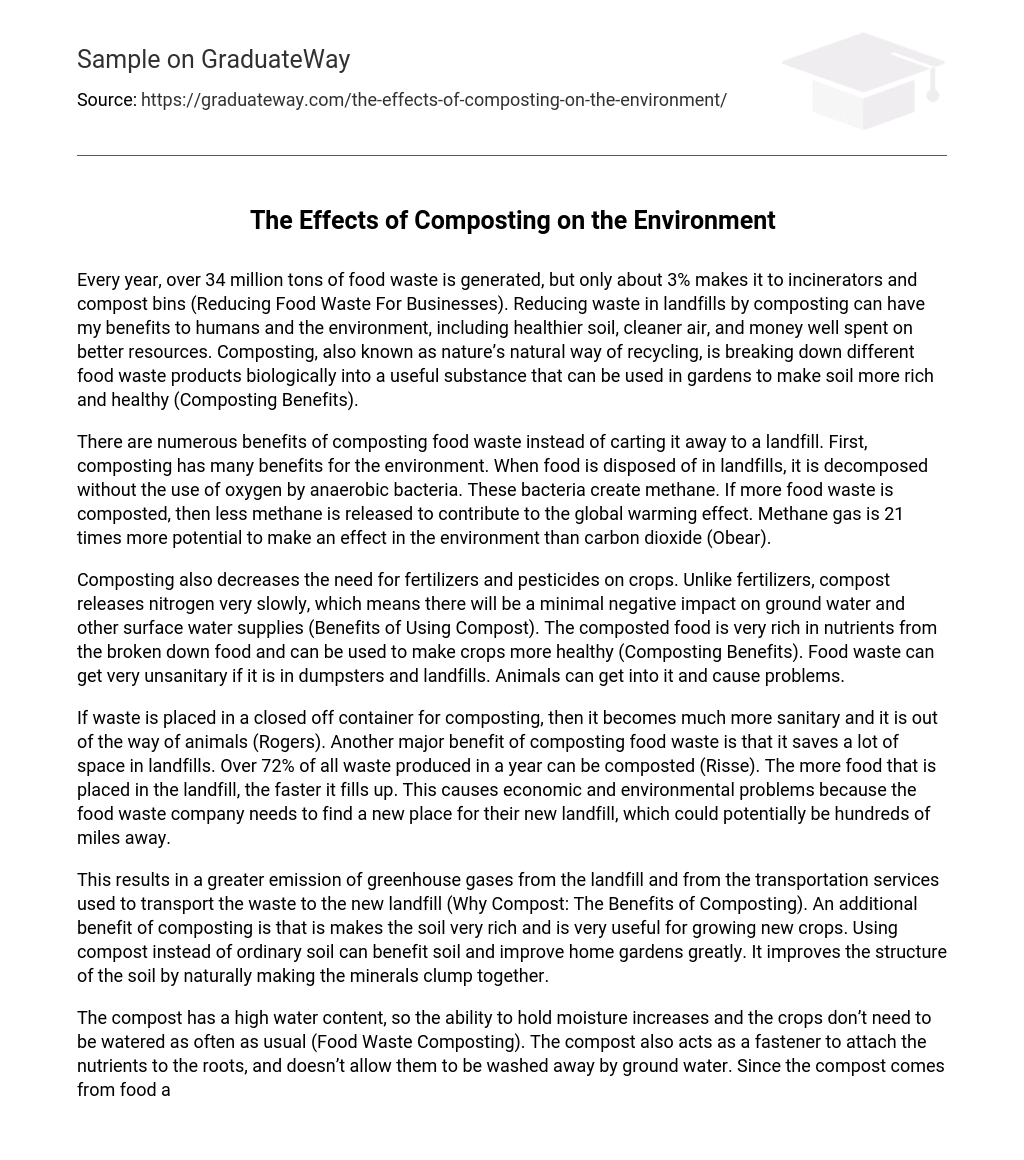Every year, over 34 million tons of food waste is generated, but only about 3% makes it to incinerators and compost bins (Reducing Food Waste For Businesses). Reducing waste in landfills by composting can have my benefits to humans and the environment, including healthier soil, cleaner air, and money well spent on better resources. Composting, also known as nature’s natural way of recycling, is breaking down different food waste products biologically into a useful substance that can be used in gardens to make soil more rich and healthy (Composting Benefits).
There are numerous benefits of composting food waste instead of carting it away to a landfill. First, composting has many benefits for the environment. When food is disposed of in landfills, it is decomposed without the use of oxygen by anaerobic bacteria. These bacteria create methane. If more food waste is composted, then less methane is released to contribute to the global warming effect. Methane gas is 21 times more potential to make an effect in the environment than carbon dioxide (Obear).
Composting also decreases the need for fertilizers and pesticides on crops. Unlike fertilizers, compost releases nitrogen very slowly, which means there will be a minimal negative impact on ground water and other surface water supplies (Benefits of Using Compost). The composted food is very rich in nutrients from the broken down food and can be used to make crops more healthy (Composting Benefits). Food waste can get very unsanitary if it is in dumpsters and landfills. Animals can get into it and cause problems.
If waste is placed in a closed off container for composting, then it becomes much more sanitary and it is out of the way of animals (Rogers). Another major benefit of composting food waste is that it saves a lot of space in landfills. Over 72% of all waste produced in a year can be composted (Risse). The more food that is placed in the landfill, the faster it fills up. This causes economic and environmental problems because the food waste company needs to find a new place for their new landfill, which could potentially be hundreds of miles away.
This results in a greater emission of greenhouse gases from the landfill and from the transportation services used to transport the waste to the new landfill (Why Compost: The Benefits of Composting). An additional benefit of composting is that is makes the soil very rich and is very useful for growing new crops. Using compost instead of ordinary soil can benefit soil and improve home gardens greatly. It improves the structure of the soil by naturally making the minerals clump together.
The compost has a high water content, so the ability to hold moisture increases and the crops don’t need to be watered as often as usual (Food Waste Composting). The compost also acts as a fastener to attach the nutrients to the roots, and doesn’t allow them to be washed away by ground water. Since the compost comes from food and natural waste, the number of microorganisms and worms increases, making the soil very rich and healthy. The compost also creates a healthy environment for plants to grow and thrive, to make much more food for humans to consume.
Furthermore, compost can replenish degrading soils by adding essential nutrients to the soil. This can make the area suitable again for food production (Manion). Another example of a benefit of composting is that it conserves resources. Composting conserves water, energy, and fuel used to make more food and products. Compost helps to soak up water, which it slowly releases to plants in the soil (Composting Benefits). The more compost that is in the soil, then the less frequently the plants need to be watered.
When compost acts as a mulch on top of the soil, it prevents water from evaporating from the lower levels of the soil (Manion). By composting, energy and fuel are also being saved. Since food and yard waste have a lot of water in them, they are heavy and a lot of energy is used to transport the food and yard waste to a landfill. Lastly, composting saves money. By reducing the amount of food waste and trash that is thrown out, people can save a lot of money on their trash bill because the trash companies have less to pick up.
When people compost instead of buying soil and mulch at a store, that also saves them a great deal of money. As a result, there are many different benefits of composting like saving the environment, reducing need for as many landfills, making soil richer, and saving resources. A lot of food waste that is produced by Americans can be composted, and that is the way to make our environment healthier. Composting is an ideal solution to get rid of a great amount of food waste, so many more people in the United States should learn this beneficial technique, which could potentially save many people a great deal of money in the end.





